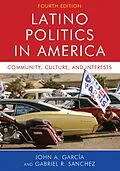The fourth edition of this widely-used textbook introduces students to what it means to be a Latino American culturally and politically at a time of unprecedented challenges for America's diverse and fastest-growing ethnic group. Garcia and Sanchez provide an in-depth examination of the individual communities that comprise the Latino culture, and how those bonds affect political development and decisions. With a look at voting, immigration, political engagement, and the critical public policies that constitute a Latino agenda, Garcia and Sanchez provide substantive insight on Latino pan-ethnic identity, growing policy issues, political participation, and the impact of changing Latino sub-groups.
Autorentext
John A. Garcia is emeritus research professor and former director of the Resource Center for Minority Data at the Inter-University Consortium for Political and Social Research at the University of Michigan, as well as emeritus professor at the University of Arizona.
Gabriel Sanchez is professor of political science at the University of New Mexico and also serves as the Executive Director of the Robert Wood Johnson Foundation Center for Health Policy and co-director of the Institute of Policy, Evaluation and Applied Research (IPEAR) at the University of New Mexico. Sanchez was formerly the director of research, and now principal at Latino Decisions, the nation's leading survey firm focused on the Latino electorate.
Inhalt
Contents
List of Figures, Tables, and Boxes
Acknowledgments
Acronyms
1 An Introduction to Latino Politics
2 Community Building In Latino America
3 Culture and Demographics
4 Latino Subgroups in the United States
5 The Politics of Interest and Culture
6 Latino Political Participation
7 Latinos in the Electoral Arena
8 Latino Organizations and Leadership
9 Immigration And Latino Immigrants
10 Education, Health, And Voting Rights Policy
11 Building Political Alliances
12 The Latino Community: Going Beyond Recognition Politics
13 COVID Pandemic and Racial Justice Movements
